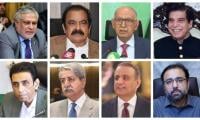To promote the education of girls in Pakistan from the standpoint of assets and strengths, a girl’s right to education – as guaranteed in the constitution and fully backed by religious scholars – should be the firm foundation and starting point.
The other valuable asset is the growing desire among parents and communities from rural areas, urban centres, tribal societies and financially-challenged backgrounds to send their girls to schools – at least for primary education. Similarly, we also have renowned individuals –including politicians, intellectuals, social activists, religious scholars, celebrities, community leaders and bureaucrats – who are active proponents for the education of girls.
In this backdrop, it is the right time to use these positive dimensions and develop a strong narrative in favour of the education of girls in the country. This fresh narrative needs to be based on a girl’s constitutional and religious right to education and must harness diverse voices of support. It also needs to be complemented with an equally strong and concerted action whereby governments, development partners, the civil society, thought leaders, communities and families can voice a clear commitment and also work towards ensuring the educational, social and economic development of girls. This tall order of developing a positive narrative and accelerating coordinated action will only be possible if girls themselves are placed at not only the centre but also at the forefront of such efforts.
I have met girls of all ages in the remote villages of Balochistan, KP, Punjab and Sindh and the urban slums of Karachi, Multan and Rawalpindi. During these interactions, what distinctly stood out was the confidence in the eyes of the girls, the vibrancy of their talent and their potential to take the lead in any field. The impressions are not of huddled up and fearful souls who are waiting to be rescued. If these girls are waiting for anything at all, it is the opportunity to evolve into effective members of society.
What do we mean by such opportunities for girls? Since the concept of opportunities is relative for various situations, it is important to note that we are talking about the basics. The bare minimum would include a school for girls that is safe and has boundary walls, toilets and sufficient covered spaces to provide shelter from the sun and rain. Moreover, the school must be located at a commutable and safe distance from their homes. A classroom must be equipped with chairs, floor mats, electricity, light bulbs and a fan. A teacher must have prior training and an interest in the profession. More importantly, he or she has the commitment to support girls and help them evolve into confident individuals.
The curriculum and learning materials must not only promote quality learning but should be gender-sensitive. Along with these basics at schools, girls also need a social and school environment where they have opportunities and the freedom to participate in sports, extracurricular activities and work readiness pursuits. These are the prerequisites that help girls in learning and developing as individuals who are capable of playing a significant role in the social and economic life of their communities.
The efforts made to ensure education for all girls in Pakistan can be strengthened by using the existing positives and putting forth a favourable narrative. Urgent action from those who influence policy matters and social attitudes is also key. However, the most crucial element of this effort has to be the active role of girls themselves. Girls with adequate knowledge about their rights in the constitution and their religion, belief in their own abilities and encouragement from the people around them can play a central role this effort.
It is important to note that this proposition does not undermine the role that men should play for a sustainable and meaningful social change in favour of girls and women in our society. Therefore, the involvement and support of men – whether it is their fathers, brothers, husbands, family members and community elders – will provide the essential scaffolding for girls to lead from the front. It is about the creation of equilibrium where women can thrive with the support of men from their communities and families.
To put girls at the forefront of efforts to promote their education in Pakistan, a deliberative and coordinated process needs to be initiated. In practice, this process can present a scenario where girls in schools are energised to bring out-of-school girls into schools by motivating them and negotiating the approval of their parents and families. Similarly, girls at different levels of education must be encouraged to engage in networks of support and mentorship for girls in junior classes.
Girls who have completed their education – especially those who have done so despite their tough financial and social circumstances – are now mentoring as relatable role models for young girls who are facing similar challenges. Young professional women who have made it through difficult personal and family situations are now involved in sharing their stories in public forums. Social marketing and advocacy campaigns for girls’ education through the print, electronic and social media are led by girls.
The federal and provincial governments have already pledged their commitment for gender equity in education by introducing legislations on the right to education. Development partners and civil society organisations have also initiated a number of commendable interventions to improve the situation of girls’ education in the country.
It is an appropriate time to position girls at the centre and forefront of all efforts to achieve real female empowerment and leadership in action. Once these initiatives are established in smaller groups and communities, they can serve as catalysts for broader political and social commitment to strengthen female education and empowerment in Pakistan.
The writer is an education adviser at the Aga Khan Foundation Pakistan.
There are over 11 million Pakistanis settled abroad, out of which around six million work in Gulf and Middle East
This year alone, US Treasury would have to roll-over $10 to $14 trillion in maturing short-term debt
Tear gas no longer marks just protest sites; it paints entire cities as battlegrounds but then again, PTI did it first
Political structures and governance systems have been central to economic and social development
It is confirmed now 40 Pakistanis had died after boat of migrants had capsized in sea near Greece
Many people believe that in future, AI will play an even more significant role in their lives







